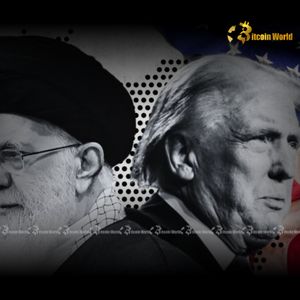Trump’s Unprecedented Move: Renewed Iran Nuclear Talks Spark Hope for Global Stability
5 min read
BitcoinWorld Trump’s Unprecedented Move: Renewed Iran Nuclear Talks Spark Hope for Global Stability In an era where global dynamics shift at a dizzying pace, and even the most seasoned observers struggle to predict the next major turn, news from Solid Intel on X has sent ripples across international relations circles. While the world often focuses on the volatility of digital assets and traditional markets, the bedrock of global stability—and by extension, market confidence—lies in geopolitical harmony. It’s in this context that reports suggest former U.S. President Donald Trump is expected to initiate crucial Trump Iran talks next week, aiming to prevent further progress in Iran’s nuclear program. This potential diplomatic overture, if it materializes, could redefine a contentious relationship and significantly alter the landscape of the Middle East. Understanding the Stakes: Why are these Iran Nuclear Talks Pivotal? The prospect of renewed dialogue between the United States and Iran under a potential Trump administration is not merely a headline; it’s a potential turning point. The relationship between these two nations has been fraught with tension for decades, particularly concerning Iran’s nuclear ambitions. The 2015 Joint Comprehensive Plan of Action (JCPOA), commonly known as the Iran nuclear deal , was a landmark agreement designed to curtail Iran’s nuclear program in exchange for sanctions relief. However, in 2018, the Trump administration withdrew from the JCPOA, reimposing stringent sanctions and leading to a significant escalation of tensions. Since then, Iran has progressively expanded its nuclear activities, raising international alarms. De-escalation of Tensions: Direct talks could offer a pathway to reduce the immediate threat of military confrontation in a volatile region. Non-Proliferation: A successful agreement could put verifiable limits on Iran’s nuclear program, preventing it from developing nuclear weapons. Regional Stability: Reduced US-Iran tensions could positively impact proxy conflicts and alliances across the Middle East. Economic Implications: Any breakthrough could lead to the easing of sanctions, potentially opening up Iran’s economy and impacting global oil markets. Navigating the Complexities of US Foreign Policy Towards Iran The potential for Trump Iran talks represents a fascinating, if not paradoxical, evolution in US foreign policy . During his previous term, President Trump adopted a ‘maximum pressure’ campaign against Iran, believing that stringent sanctions and diplomatic isolation would force Tehran to capitulate. This approach, while popular with some regional allies and domestic constituencies, did not lead to a new, broader agreement as initially hoped. Instead, it contributed to increased regional instability and Iran’s accelerated nuclear activities. The current reports suggest a potential shift in strategy, hinting at a willingness to engage directly, perhaps acknowledging that isolation alone has not yielded the desired results. A new approach, however, would face immense challenges. Both sides carry deep-seated mistrust, shaped by decades of adversarial interactions, including: The 1979 Iranian Revolution and hostage crisis. Support for opposing sides in regional conflicts. Accusations of state-sponsored terrorism and human rights abuses. The ongoing debate over Iran’s ballistic missile program and regional influence, which were not fully addressed by the JCPOA. Any future negotiations would need to carefully balance these historical grievances with pragmatic pathways forward, ensuring that the terms are verifiable and sustainable for both parties. Will Middle East Stability Benefit from Renewed Diplomacy? The ripple effects of any significant movement in Trump Iran talks would be felt keenly across the entire region. The pursuit of Middle East stability is a goal shared by many, yet the path to achieving it is fraught with conflicting interests. Countries like Israel and Saudi Arabia, long wary of Iran’s regional ambitions and nuclear program, would be keenly observing any new diplomatic efforts. Their concerns about Iran’s influence in Lebanon, Syria, Yemen, and Iraq would likely feature prominently in their reactions to any potential deal. Conversely, a reduction in US-Iran tensions could pave the way for broader regional de-escalation, fostering an environment where diplomatic solutions to other conflicts become more feasible. Consider the potential scenarios: Successful De-escalation: A new, verifiable agreement could reduce the risk of direct conflict, allowing regional actors to focus on economic development and internal challenges. Continued Skepticism: Even with talks, deep mistrust could persist, leading to a cautious or even negative response from regional powers who fear a ‘bad deal’ that legitimizes Iran’s nuclear program or regional influence. Internal Dynamics: Both the US and Iran face internal political pressures that could derail negotiations. Hardliners in both countries may view compromise as weakness, making sustained dialogue difficult. Analyzing the Geopolitical Impact: What Does This Mean for the World? Beyond the immediate region, the geopolitical impact of potential Trump Iran talks extends globally. Major powers like China, Russia, and European nations have their own stakes in the stability of the Middle East and the future of the Iran nuclear deal . China, a major importer of Iranian oil, would welcome any move that stabilizes energy markets and allows for increased trade. Russia, which has its own strategic partnership with Iran, would likely support diplomatic efforts that reduce US unilateralism. European nations, who have consistently advocated for the preservation of the JCPOA, would see renewed talks as an opportunity to revive multilateral diplomacy and prevent nuclear proliferation. This situation highlights the interconnectedness of global affairs. A shift in US-Iran relations could: Influence global oil prices and energy security. Affect the dynamics of international sanctions regimes. Set precedents for how major powers approach non-proliferation challenges. Potentially open new avenues for cooperation or competition among global players. The world watches to see if these talks can bridge profound divides and steer a path towards greater stability in a region vital to global peace and prosperity. What’s Next for the Trump Iran Talks? While the initial report from Solid Intel on X is concise, the implications are vast. As details emerge regarding the scope and nature of these anticipated talks, the international community will be scrutinizing every development. Key questions remain: Who will be at the table? What will be the preconditions, if any? What kind of deal, if any, could realistically emerge from such negotiations? The answers to these questions will not only shape the future of US-Iran relations but also have profound consequences for Middle East stability and the broader geopolitical impact on global affairs. For investors, policymakers, and global citizens alike, staying informed on these developments is crucial. The path to a resolution will undoubtedly be complex, marked by periods of optimism and potential setbacks. However, the mere initiation of dialogue after years of heightened tensions signals a potentially transformative moment in international diplomacy. To learn more about the latest geopolitical trends and their impact on global markets, explore our article on key developments shaping Middle East stability and the broader geopolitical landscape. This post Trump’s Unprecedented Move: Renewed Iran Nuclear Talks Spark Hope for Global Stability first appeared on BitcoinWorld and is written by Editorial Team

Source: Bitcoin World



